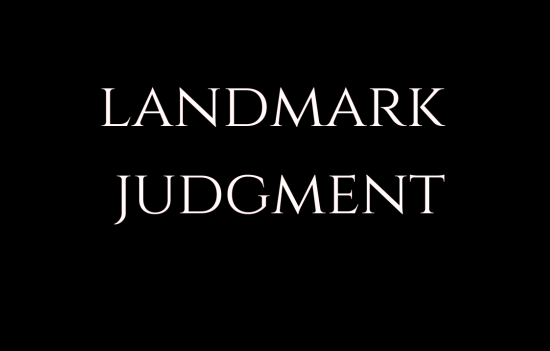CASE BRIEF
Appellants- Shabnam
Respondents- Union of India & Ors
Decided on: 27.05.2015
Statues Referred-
- Constitution of India
- Criminal Procedure Code
Facts:
- Writ petition No. 88 of 2015 is filed by Shabnam and Writ petition No. 89 of 2015 is filed by National Law University, Delhi, espousing the cause of Salim. Both Shabnam and Salim were co-accused in a murder case that was tried against them on the allegations that they had committed murders of seven persons who were the members of Shabnam’s family during the intervening night of 14th and 15th April, 2008. They were tried together and after the trial, the learned Sessions Court returned with the finding, holding them guilty of the said murders, for which they were charged and pronounced death sentence on both these convicts vide judgment and Sentence dated 15.07.2010, subject to confirmation by the High Court.
- The High Court of Allahabad confirmed the death sentence of both the convicts vide Judgment and order dated 26.04.2013. The Judgment of the High Court was challenged in this Court and on 15.05.2015, the appeals of the convicts were dismissed by this Court as well, thereby, confirming the conviction as well as sentence of death imposed on them.
Issue:
The convicts have not exhausted their judicial and administrative remedies, which are still open to them, though their appeals in the highest Court have failed; they were been affirmed the imposition of death penalty.
Contentions by Parties:
Appellant’s Arguments
- The present Writ Petitions are filed on the allegations that on 21.05.2015, death warrants have been issued by the learned Sessions Judge, which are impermissible in as much as various remedies which are available to the convicts, even after the dismissal of the appeals by this Court, are still open and are yet to be exercised by them.
- It is submitted that these convicts can file review petition seeking review of the judgment dated 15.05.2015.
- It was also said that the convicts have the right to file mercy petitions to the Governor of Uttar Pradesh and to the President of India. In these circumstances, the execution of the death sentence within six days of the dismissal of the Criminal Appeal is challenged as illegal and contrary to the provisions of Article 21 of the Constitution of India.
Respondent’s Arguments
- Notice of these petitions was issued to the Union of India as well as to the State of Uttar Pradesh on 25.05.2015. Ms. Pinky Anand, learned ASG, has appeared on behalf of the Union of India and Ms. Pragati Neekhra, learned counsel, has appeared on behalf of the State of Uttar Pradesh.
- Ms. Pinky Anand has brought to the notice the instructions issued by the Ministry of Home Affairs, Government of India, which delineates the procedure regarding petitions for mercy in death sentence case. She has referred to the following portion from the said instructions which impose certain duties on the Superintendent of Jail in connection with petitions for mercy from or on behalf of the convicts in sentence of death, paragraph 2 thereof reads as under: “ On receipt of the intimation of the dismissal by the Supreme Court of the appeal or the application for special leave to appeal to it lodged by or on behalf of the convict, in case the convict concerned has made no previous petition for mercy, the Jail Superintendent shall forthwith inform him (the convict) that if he desires to submit a petition for mercy, it should be in writing and within seven days of the date of such intimation.
- The learned counsel for the State of Uttar Pradesh also informed this Court that after the death warrants dated 21.05.2015 issued by the learned Sessions Judge were received by the Superintendent of Jail sent these death warrants back to the learned Sessions Judge pointing out that the warrants were defective as the date and time of execution of the death sentence was not affixed thereupon.
Judgment:
Since the death warrants were signed by the Sessions Judge in haste, without waiting for the exhaustion of the aforesaid remedies on the part of the convicts, the same are hereby quashed and set aside.
Rule of Law:
That law should always be for providing justice.
Conclusion-
Shabnam v. Union of India is a noteworthy judicial case that mirrors the philosophy of justice, for it mandates that all legal remedies ought to be exhausted before initiating warrant proceedings. Therefore, public demand of death sentence as vengeance cannot infringe every persons right to seek and receive justice.

